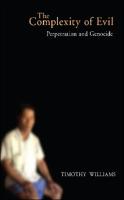The Complexity of Evil
Perpetration and Genocide
Author(s)
Williams, Timothy
Collection
Knowledge Unlatched (KU)Number
104973Language
EnglishAbstract
Why do people participate in genocide? The Complexity of Evil responds to this fundamental question by drawing on political science, sociology, criminology, anthropology, social psychology, and history to develop a model which can explain perpetration across various different cases. Focusing in particular on the Holocaust, the 1994 genocide against the Tutsi in Rwanda, and the Khmer Rouge genocide in Cambodia, The Complexity of Evil model draws on, systematically sorts, and causally orders a wealth of scholarly literature and supplements it with original field research data from interviews with former members of the Khmer Rouge. The model is systematic and abstract, as well as empirically grounded, providing a tool for understanding the micro-foundations of various cases of genocide. Ultimately this model highlights that the motivations for perpetrating genocide are both complex in their diversity and banal in their ordinariness and mundanity.
Keywords
Political Science; Human RightsISBN
9781978814332Publisher
Rutgers University PressPublisher website
https://www.rutgersuniversitypress.org/Publication date and place
2020Grantor
Imprint
Rutgers University PressClassification
Human rights, civil rights


 Download
Download